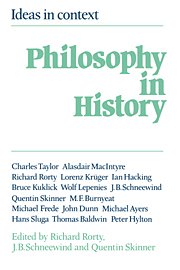Book contents
- Frontmatter
- Contents
- Dedication
- Preface
- Notes on contributors
- Introduction
- PART I
- PART II
- 10 The sceptic in his place and time
- 11 The sceptic's two kinds of assent and the question of the possibility of knowledge
- 12 The concept of “trust” in the politics of John Locke
- 13 Berkeley and Hume: a question of influence
- 14 Frege: the early years
- 15 Moore's rejection of idealism
- 16 The nature of the proposition and the revolt against idealism
- Index
16 - The nature of the proposition and the revolt against idealism
Published online by Cambridge University Press: 03 December 2009
- Frontmatter
- Contents
- Dedication
- Preface
- Notes on contributors
- Introduction
- PART I
- PART II
- 10 The sceptic in his place and time
- 11 The sceptic's two kinds of assent and the question of the possibility of knowledge
- 12 The concept of “trust” in the politics of John Locke
- 13 Berkeley and Hume: a question of influence
- 14 Frege: the early years
- 15 Moore's rejection of idealism
- 16 The nature of the proposition and the revolt against idealism
- Index
Summary
Writing in 1900, soon after his rejection of neo-Hegelianism, Russell made the following striking statement: ‘That all sound philosophy should begin with an analysis of propositions is a truth too evident, perhaps, to demand a proof.’ What is remarkable about this statement is not just that Russell thinks the analysis of propositions to be of crucial philosophical importance, but that he thinks this fact is obvious. G. E. Moore was very closely associated with Russell at this time, and the first work that he published after rejecting idealism shows a similar concern with the nature of the proposition. It is called ‘The nature of judgment’. In that article, and in the longer work from which it is drawn, Moore uses the notion of judgment as a point of attack against Bradley and Kant, and goes on to begin to articulate a metaphysics fundamentally opposed to that of Kant or Bradley or any other idealist. So, at the moment when Russell and Moore rejected idealism the problem of the nature of the proposition was a central concern of theirs. In spite of what Russell says, it is I think not obvious why this should be so. What I want to do in the first part of this paper, then, is to sketch an explanation, in historical terms, of why this problem might have seemed to them, at that moment, a central and inescapable concern.
- Type
- Chapter
- Information
- Philosophy in HistoryEssays in the Historiography of Philosophy, pp. 375 - 398Publisher: Cambridge University PressPrint publication year: 1984
- 16
- Cited by



